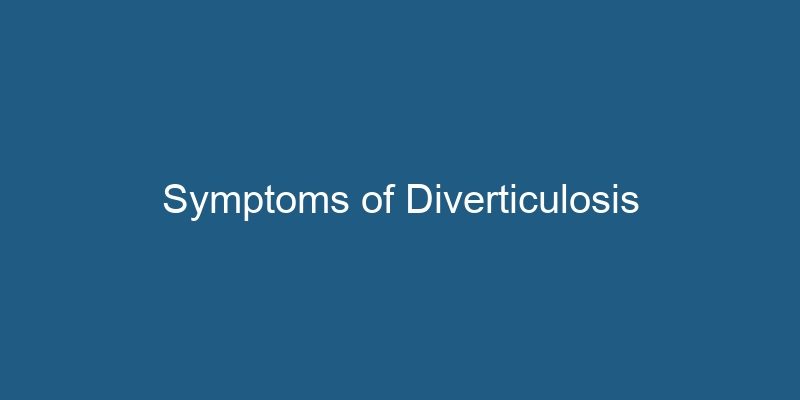Diverticulosis is a condition characterized by the formation of small pouches or pockets in the wall of the colon. These pouches, called diverticula, can become inflamed or infected, leading to a more serious condition known as diverticulitis. Identifying the symptoms of diverticulosis is crucial for early detection and appropriate treatment. In this article, we will discuss the various symptoms associated with diverticulosis and how they may manifest.
- 1. Abdominal Pain
- 2. Changes in Bowel Habits
- Diverticulitis: Signs, Symptoms, Causes, and Treatment | Merck Manual Consumer Version Quick Facts
- Diverticulosis & Diverticulitis: Symptoms & Treatments – Ask A Nurse | @LevelUpRN
- 3. Bloating and Gas
- 4. Rectal Bleeding
- 5. Fever and Chills
- 6. Nausea and Vomiting
- 7. Loss of Appetite
- 8. Fatigue and Weakness
- 9. Urinary Symptoms
- 10. Unexplained Weight Loss
- 11. Complications
- Conclusion
1. Abdominal Pain
One of the most common symptoms of diverticulosis is abdominal pain. This pain is typically felt in the lower left side of the abdomen, although it can occur in other areas as well. The pain may be constant or intermittent and can range from mild to severe. It is often described as a cramping or sharp sensation.
2. Changes in Bowel Habits
Diverticulosis can also cause changes in bowel habits. Some individuals may experience constipation, while others may have diarrhea. In some cases, there may be alternating periods of constipation and diarrhea. These changes in bowel habits can be disruptive and may lead to discomfort or distress.
Diverticulitis: Signs, Symptoms, Causes, and Treatment | Merck Manual Consumer Version Quick Facts
Diverticulosis & Diverticulitis: Symptoms & Treatments – Ask A Nurse | @LevelUpRN
3. Bloating and Gas
Bloating and excessive gas are common symptoms of diverticulosis. The presence of diverticula in the colon can disrupt normal digestion and lead to an accumulation of gas. This can result in bloating, discomfort, and a feeling of fullness in the abdomen.
4. Rectal Bleeding
Rectal bleeding is a concerning symptom that can occur in individuals with diverticulosis. It is usually painless and presents as bright red blood in the stool. While rectal bleeding can have various causes, it should always be evaluated by a healthcare professional to determine the underlying cause and appropriate treatment.
5. Fever and Chills
In cases where diverticulosis progresses to diverticulitis, individuals may experience symptoms such as fever and chills. These systemic symptoms indicate an infection in the diverticula and require immediate medical attention.
6. Nausea and Vomiting
Diverticulitis can cause nausea and vomiting, particularly if there is an infection or inflammation present. These symptoms may occur alongside abdominal pain and fever, further indicating the need for medical evaluation and treatment.
7. Loss of Appetite
Diverticulosis can lead to a loss of appetite, which may be due to the discomfort or pain experienced during eating. The presence of diverticula can also disrupt the normal absorption of nutrients, contributing to a decrease in appetite.
8. Fatigue and Weakness
Chronic diverticulosis can cause fatigue and weakness. The body’s continuous effort to fight inflammation or infection can result in a general feeling of tiredness and decreased energy levels.
9. Urinary Symptoms
In some cases, diverticulosis can lead to urinary symptoms such as frequent urination or urgency. This occurs when the diverticula put pressure on the bladder or urethra, causing changes in urinary patterns.
10. Unexplained Weight Loss
Unexplained weight loss can occur in individuals with diverticulosis, especially if the condition is accompanied by significant inflammation or infection. The body’s response to these conditions can cause a loss of appetite and difficulty absorbing nutrients, leading to weight loss.
11. Complications
In severe cases, diverticulosis can lead to complications such as abscesses, fistulas, or bowel obstruction. These complications may present with additional symptoms such as severe abdominal pain, changes in bowel movements, and the presence of pus or mucus in the stool. Immediate medical attention is required if any of these complications are suspected.
Conclusion
Recognizing the symptoms of diverticulosis is essential for prompt diagnosis and appropriate management. If you experience any of the aforementioned symptoms, it is important to consult a healthcare professional for a thorough evaluation and to discuss treatment options. Early detection and intervention can help prevent complications and improve overall outcomes for individuals with diverticulosis.

